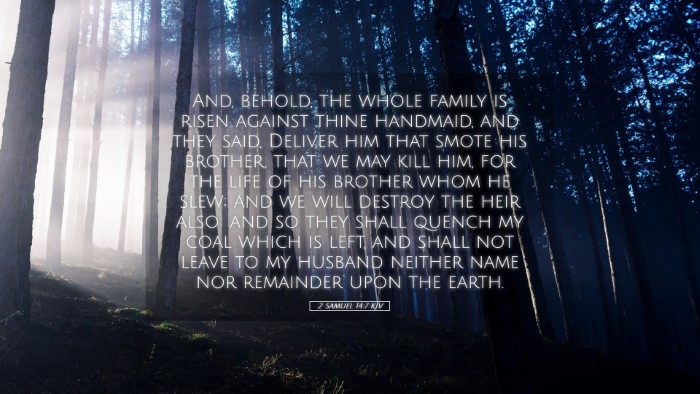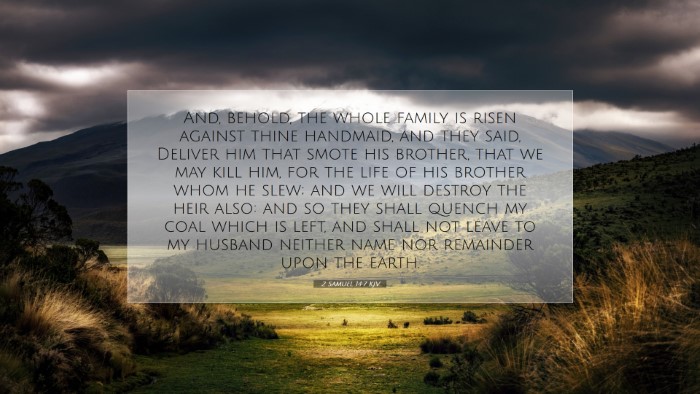Commentary on 2 Samuel 14:7
Verse: 2 Samuel 14:7 - "And behold, the whole family is risen against thine handmaid, and they said, Deliver him that smote his brother, that we may kill him for the life of his brother whom he slew; and we will destroy the heir also: and so they shall quench my coal which is left, and shall not leave to my husband neither name nor remainder upon the earth."
Introduction
This verse is nestled within the poignant narrative of Absalom and the consequences of his actions within the context of David’s family. It brings to light the themes of justice, mercy, and familial loyalty. Contextually, we find ourselves in the midst of a parable recounted by Joab to persuade David to bring Absalom back to Jerusalem after his exile. The depth of the family dynamics and the poignant plea of the woman from Tekoa speak to the larger themes within the biblical narrative.
Historical and Literary Context
The setting of this passage reflects a time of turmoil in David's reign, particularly following the tragic events involving Absalom, Amnon, and Tamar. The woman from Tekoa’s story exemplifies the desperation of a grieving mother, paralleling the urgency of David’s situation as king and father. The plea of the woman serves as a microcosm of the broader strife in Israel at the time.
Exegesis of the Verse
Family Conflict and Desire for Justice: The verse encapsulates a family in crisis. The woman's grief reveals a deep-seated conflict within her family, reflecting the real emotional and social tensions that can arise in familial relations, especially following acts of violence.
- Family vs. Justice: The struggle between familial loyalty and judicial justice is a recurring theme throughout scripture. The demand for retribution indicated by the family against the slayer showcases the human inclination towards vengeance when wronged.
- The Symbolism of the "Coal": The metaphor of the “coal” left behind symbolizes a flicker of hope and future legacy. This imagery suggests the potential for devastating loss, which points to the importance of preserving the legacy and lineage within a family.
Insights from Public Domain Commentaries
Matthew Henry
Matthew Henry observes that the passage highlights the emotional turmoil that envelops the domestic sphere when conflict arises. The reference to the family's demands for vengeance illustrates the breakdown of communal relations when justice seems unfulfilled. Henry emphasizes the importance of mercy in leadership, as demonstrated by David’s consideration of the woman’s plight.
Albert Barnes
Albert Barnes provides a detailed analysis of the characters involved, stressing the subjectivity of justice as communicated by the woman. He notes that the family’s desire to see the slayer punished evokes the principle of lex talionis (the law of retribution), yet the plight of the woman reflects the complexity and nuance of mercy and grace that leaders must navigate. Barnes argues that God’s judgment often transcends human understanding of justice.
Adam Clarke
Adam Clarke delves into the implications of the statement on the preservation of one’s name and legacy. He interprets the plea of the woman as a deep yearning to maintain kinship and familial honor. Clarke also draws parallels between her situation and that of David, suggesting the underlying spiritual and emotional symmetries present in their battles with loss and the pursuit of reconciliation.
Theological Implications
This verse raises critical theological questions concerning justice, mercy, and the value of human life. It provokes thoughts on how leaders should respond to crises within their communities, invoking both legalistic and pastoral approaches to conflict resolution.
- The Nature of God’s Justice: The passage challenges readers to consider the divine perspective on justice as inherently intertwined with mercy.
- Human Responsibility: The responsibilities borne by individuals and leaders to navigate familial and societal tensions become apparent, highlighting the complexities of human relationships.
Practical Applications for Pastoral Ministry
For pastors and spiritual leaders, this verse serves as a poignant reminder of the importance of reconciliation and the often complex realities that accompany conflict resolution within families and communities. Here are some practical applications:
- Encouraging Dialogue: Facilitating conversations that acknowledge grievances while seeking paths toward forgiveness and healing.
- Emphasizing Grace: Teaching congregants about the power of grace and mercy, especially when faced with difficult interpersonal conflicts.
- Modeling Leadership: Embodying the values of compassion and justice in the face of community challenges, much like David’s eventual response to Absalom’s tragic circumstances.
Conclusion
2 Samuel 14:7 provides profound insight into the human experience of conflict, loss, and the search for justice. Through the lens of this passage, readers can glean insights into the nature of familial relationships and the godly attributes of mercy and grace. The commentaries by Henry, Barnes, and Clarke enrich our understanding, bridging the ancient narrative with contemporary applications. Ultimately, this verse serves as a call to reflect on the complexities of human nature and the divine call to reconciliation within our lives.


